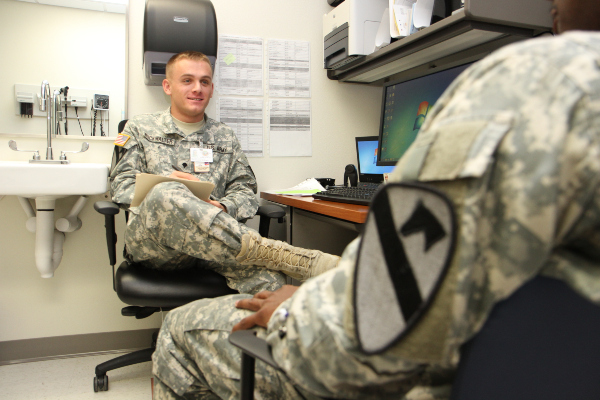Mental illness is an extremely serious and often overlooked problem in the United States.
Millions of people deal with mental illness every year, but that doesn’t mean many of the cases are untreatable.
We’re often asked if you can serve in the military with a mental illness.
There are military disqualifications for mental health, including ADHD, Depression, PTSD, and many others.
However, not every case is black and white.
Continue reading to find out what the U.S. Military generally allows and does NOT allow.
Related Article – 20 Health Conditions That May Disqualify You From Military
Table of Contents
9 Mental Health Conditions That Are Disqualifying in the Military

Nearly 20% of the U.S. population deals with some type of mental illness.
Not just limited to adults, a reported 16.5% of America’s youth (ages 6-17) experienced a mental health disorder in 2016.
Despite the stigma, mental illness is not uncommon or a “personal problem”.
These diseases and conditions are very serious and require treatment like any other medical condition.
Serving in the military with mental illness has always been a delicate issue, considering soldiers carry weapons and could put other lives in jeopardy.
The military treats mental health very seriously, considering going into combat or other stressful situations could trigger unwanted symptoms.
However, the Armed Forces have recently adapted and changed some of its previous guidelines regarding mental health disqualifications for military service.
Here’s a list of 9 of the most common mental health conditions, and whether or not the condition will disqualify you from military service:
1. Anxiety Disorder
Anxiety disorders are the most common form of mental illness in the United States.
Oftentimes, anxiety manifests itself during your adolescent years.
You may find it difficult to be around people, or struggle to get on with life because the anxiety is simply overbearing.
If it prevents you from doing things you want to do or makes you feel physically sick, it’s important to talk to a physician about your symptoms.
The military has a problem with lumping the various types of anxiety disorders into one general problem.
However, the general rule is that you cannot enter the Armed Forces if you required inpatient or outpatient care related to an anxiety disorder in the last 12 months.
Additionally, the Department of Defense examines if any treatment has been prescribed for the disorder in the last 36 months.
Though anxiety issues like panic disorder or social anxiety may disqualify you from serving in the military, branches like the Army are beginning to loosen their standards on the problem.
Related Article – VA Disability For Anxiety Disorders Guide
2. Asperger’s
The Department of Defense treats Asperger’s Syndrome as an automatic mental health disqualifier.
However, it is important to remember that just like almost every other form of mental illness there are varying levels of the condition.
For example, someone with a mild form of Asperger’s could potentially receive a medical waiver from the military.
Though you shouldn’t count on it, there is hope if you make your case.
Gathering all medical records related to the syndrome and answering any questions a recruiter has about the condition goes a long way.
3. Autism
In the past, having autism was an automatic disqualifier for military service.
However, like many forms of mental illness, the Department of Defense is starting to change its perspective on the matter.
It is possible that if you were diagnosed with autism as a child you may still have the ability to overcome the condition and receive a waiver.
Unfortunately, there is no clear black-and-white answer.
Like a lot of things in the military, the answer depends on what branch you are looking to join and what types of symptoms you regularly deal with regarding autism.
You can get more details about serving in the military with autism by reading our article on the subject.
4. Bipolar Disorder
Bipolar Disorder is a serious mental illness.
It causes unusual shifts in your mood, concentration, energy, and ability to do day-to-day functions.
Unfortunately, bipolar disorders are an automatic military mental health disqualifier.
The military considers mood disorders that require medication disqualifying.
5. Depression
Depression is a complicated mental health problem that affects over 17 million Americans.
It is also becoming more common in minors (ages 3-17) with nearly two million reported cases.
However, there are many forms of depression, and some people are capable of living very normal lives with the mood disorder.
The military will study a case of depression very closely to determine eligibility.
In general, any mood disorder that requires medication to treat is a mental health disqualification standard.
The military also assesses whether the condition affects your social ability, learning, or work efficiency.
You may request a waiver for depression, but your efforts may have better odds depending on the branch you apply for.

6. Learning Disabilities (ADHD & ADD)
Learning disabilities like Attention Deficit Disorder (ADD) or Attention Deficit Hyperactivity Disorder (ADHD) are also complicated.
In general, learning disabilities are disqualifying.
However, if an applicant can demonstrate passing academic performance you may get a waiver.
You also need to prove you haven’t used any medication for the learning disability in the last year.
The military primarily wants to make sure the disability will not affect your job performance with a branch.
There are minimum qualifying standards for the Armed Services Vocational Aptitude Battery tests as well.
7. Obsessive-Compulsive Disorder (OCD)
Obsessive-Compulsive Disorder is a type of anxiety disorder that causes thoughts or obsessions that obstruct you from living a normal life.
There is also the tendency to do something repetitively (or have compulsions) with OCD.
Obsessive-compulsive disorder (OCD) is not as well understood as other mental illnesses.
In general, this mental health condition is disqualifying in the military.
8. Post Traumatic Stress Disorder (PTSD)
Post Traumatic Stress Disorder is also an anxiety problem.
The disorder causes persistent mental or emotional stress, which is usually a result of some form of trauma.
Unfortunately, PTSD is a common mental illness that gets diagnosed in patients who previously served in the military.
While it is rarer for people to try and join the military with PTSD, it is not completely abnormal.
Unfortunately, the military considers PTSD a disqualifying mental health condition.
If you’ve been diagnosed with PTSD, you likely won’t receive a waiver.
9. Suicidal Tendencies
The military considers any suicide attempts in the past as disqualifying for military service.
Additionally, any history of suicidal behavior that includes gestures or discussions about the thought is disqualifying.
The military also previously disqualified those that had a history of self-mutilation.
However, branches like the Army are currently loosening their guidelines on the matter.
The Department of Defense must treat previous suicide attempts or suicidal behavior very seriously since you’ll carry a weapon and become trained as a soldier.
Related Article: Can You Join The Military With ADD/ADHD?
How does the military test for mental health disorders?

The military treats mental health very seriously and takes a rigid stance on enforcing disqualifications.
Military mental health disqualifications can prevent you from serving in the military.
The problem with many types of mental illness is that the diagnosis is highly subjective.
Furthermore, there are varying levels of anxiety disorders and depression.
For example, you may be aware that you struggle with anxiety yet be able to manage it without needing medication.
Meanwhile, another person may need medication to help keep anxiety and panic attacks from becoming too severe.
The military conducts a psychological evaluation during Military Entrance Processing Stations (MEPS).
Don’t take the psychological evaluation personally because every new recruit has to endure the same evaluation.
The military needs to determine if you have mental aptitude in addition to meeting physical fitness standards for enlistment.
Related Article: Army APFT Standards for Males and Females
MEPS Mental Health Screening
The military uses a mental health screening to see if there are any potential red flags that will prevent you from carrying out your role fully with the military.
Furthermore, the military wants to verify that you aren’t a danger to yourself or others.
Both a military recruiter and an evaluator at MEPS will ask you questions about your mental health through a one-on-one interview.
The interview isn’t too detailed if there are no concerns or red flags within your medical record.
Prepare yourself to answer questions honestly and truthfully, but most agree that you don’t need to bring up any preexisting conditions unless it has greatly impacted your life in the past.
Everyone deals with some type of anxiety and has days when they feel down.
However, those symptoms are different from someone that is diagnosed with and suffers from mood disorders or other mental illnesses.
Frequently Asked Questions (FAQ)

Here are some frequently asked questions about military disqualifications for mental health:
Can you join the Army with a history of depression?
Depression is a difficult mental health condition for anyone to figure out, much less the military.
The military currently has a broad definition of depression that doesn’t cover its many facets.
It’s still struggling to find out how to deal with the rising problem in the United States.
While in the past it was a disqualifier, most military branches are changing their stance on diagnosed examples.
Therefore, you may receive a waiver after the military examines your personal circumstances.
The military will study things like when you were diagnosed, current symptoms, if you take medication for your depression, and if you’ve received inpatient/outpatient care in the last year.
Can you take antidepressants in the military?
In the past, the military has disqualified just about any medication related to mental health.
However, the current policy is a little different.
It generally disqualifies anyone that is or has taken medication for mental illness in the last year.
If it’s been more than a year you may receive a waiver but the military will need to examine your medical records and speak to your physician.
The rules apply to medications like Zoloft, Prozac, Paxil, Celexa, and Wellbutrin.
However, that doesn’t stop the military from reportedly prescribing antidepressants to a surprisingly high number of active-duty soldiers.
It’s worth pointing out that some people advise not mentioning any previous mental health diagnoses or medications to a recruiter, as well as MEPS.
The decision is up to you, but some strongly believe that what isn’t known doesn’t hurt anyone.
However, the military has ways of finding out if the mental health condition is on your medical records.
Related Article: Can You Join The Military With A Felony?
Can you join the military with PTSD?
Post Traumatic Stress Disorder (PTSD) disqualifies you from military service in most cases.
The problem with PTSD is that the disorder is often linked to serious trauma like what you might experience serving the Armed Forces.
Therefore, serving in the military might only make symptoms worse.
You should avoid service to find more effective ways to cope with the disorder.
Is having anxiety or an anxiety disorder disqualifying?
As we mentioned earlier, anxiety is a broad term that covers several different mental illnesses.
For example, bipolar disorder and PTSD are extremely severe forms of mood disorders and usually difficult to receive a waiver.
Meanwhile, other forms of anxiety such as having panic attacks or dealing with mild forms of depression may allow you to obtain a waiver.
The military examines whether you recently had inpatient or outpatient care related to your anxiety.
It also studies if you took any prescription medication to help deal with anxiety in the last year or last three years depending on the condition.
What about alcohol or drug abuse?
A history of alcohol or drug dependence may disqualify you from military service.
The military carefully scrutinizes alcohol abuse or drug abuse that requires inpatient or outpatient care.
Problems with alcohol or drugs can become problematic during military service for several reasons.
It can also enhance or worsen symptoms of other, undiagnosed mental health conditions.
Conclusion
Mental health is a delicate issue that needs more funding and understanding to help raise awareness.
One in five people suffers from some type of mental illness.
Whether it is a mild form of anxiety or depression or you struggle with life-altering conditions like bipolar disorder or suicidal tendencies – the first step is to get help.
Many types of mental illnesses are treatable and can reduce serious symptoms.
When it comes to military service several mental illnesses are disqualifying.
However, the military (especially the Army) has recently relaxed several of its guidelines regarding mental illness.
Therefore, you may qualify for a waiver after the military carefully examines your personal circumstances.
Resources
SAMHSA’s National Helpline – A free and confidential government service that helps individuals and families coping with mental and/or substance use disorders.
SAMHSA Behavioral Health Treatment Services Locator – Help with finding a treatment facility near you.
Anxiety and Depression Association of America – Help with finding a therapist.
See Also
- Ikon Pass Military Discount: Learn How To Save Big - January 31, 2025
- RTIC Military Discount: Find Out How To Save Big on Gear - January 30, 2025
- Traeger Military Discount: Learn How To Save Big on Smokers - January 28, 2025


